The Impact of Technological Innovations on Accounting Skills and AI
VerifiedAdded on 2021/05/31
|8
|1466
|31
Report
AI Summary
This report examines the impact of technological innovations on accounting skills, focusing on the effects of artificial intelligence and automation. It discusses how these advancements have changed the way accountants work, making processes more efficient and accurate through software and cloud-based systems. The report highlights the positive impacts, such as increased productivity and cost savings, while also addressing potential drawbacks like data security concerns. Furthermore, it explores how AI is transforming the future of accounting, with machine learning and other technologies automating tasks and potentially reshaping the roles of accountants and bookkeepers. The report concludes that a deep understanding of these technologies is crucial for accountants to adapt and thrive in the evolving landscape, emphasizing the need to balance the benefits of automation with the preservation of human expertise. It also references several sources to support its findings.
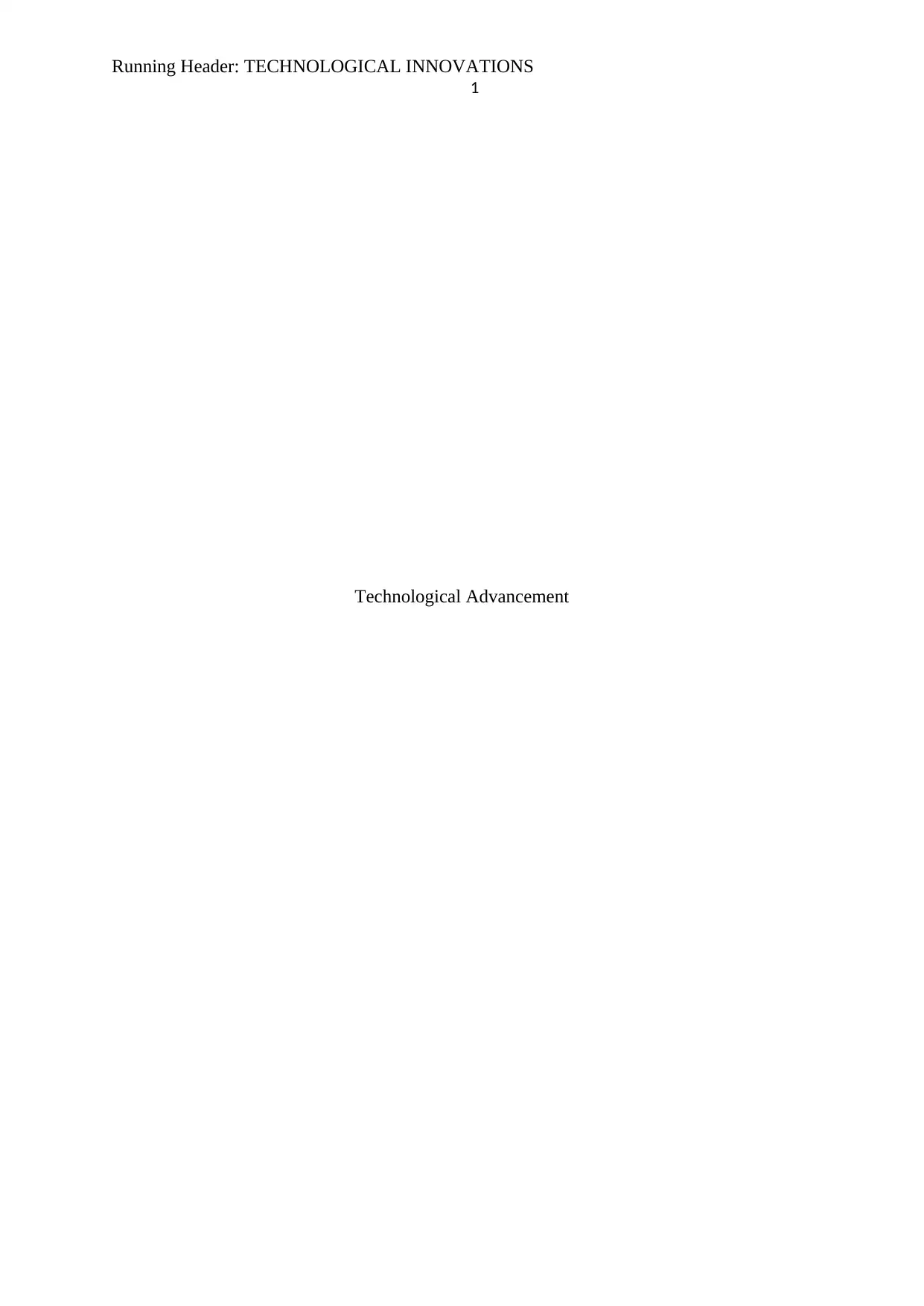
Running Header: TECHNOLOGICAL INNOVATIONS
1
Technological Advancement
1
Technological Advancement
Paraphrase This Document
Need a fresh take? Get an instant paraphrase of this document with our AI Paraphraser
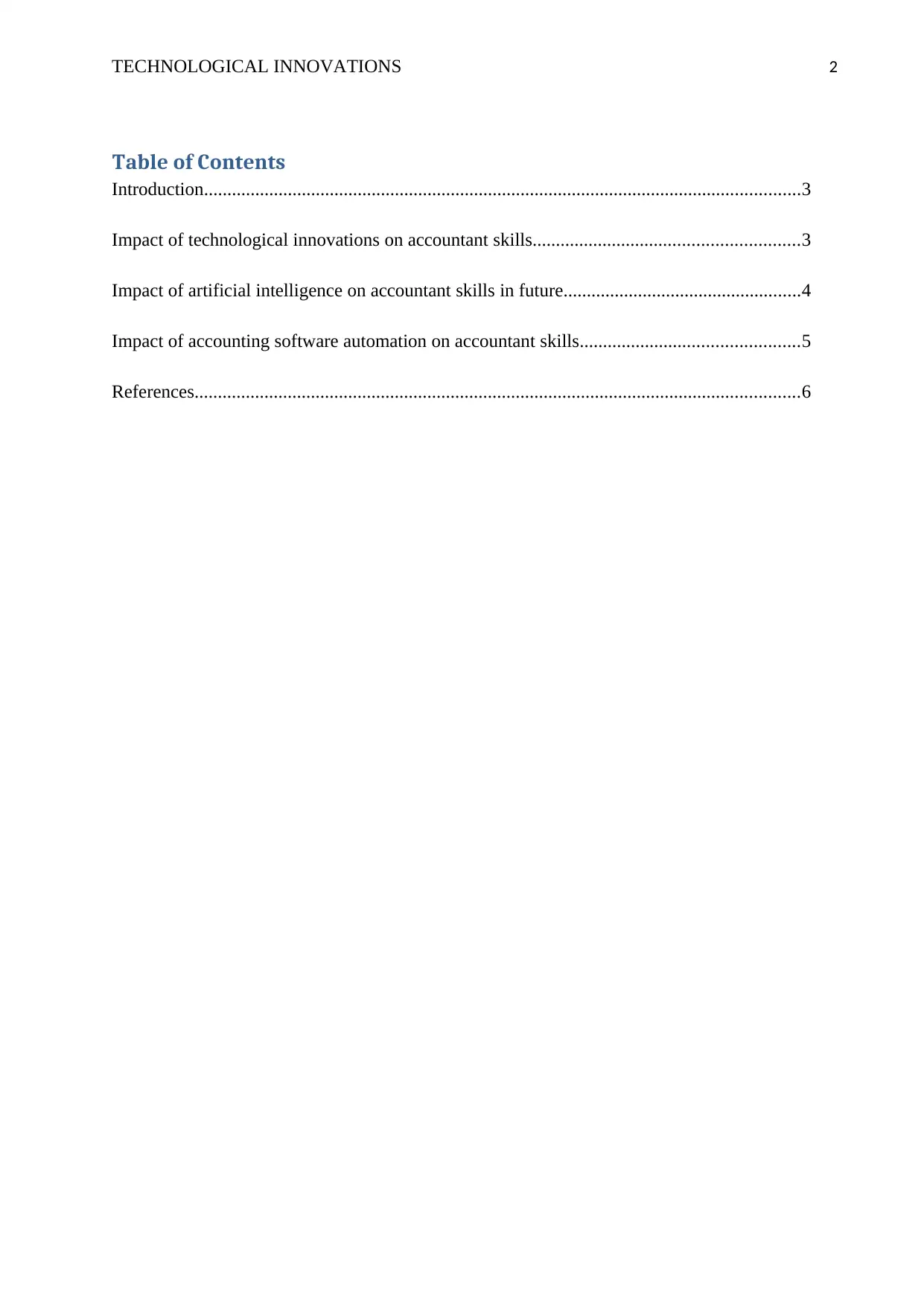
TECHNOLOGICAL INNOVATIONS 2
Table of Contents
Introduction................................................................................................................................3
Impact of technological innovations on accountant skills.........................................................3
Impact of artificial intelligence on accountant skills in future...................................................4
Impact of accounting software automation on accountant skills...............................................5
References..................................................................................................................................6
Table of Contents
Introduction................................................................................................................................3
Impact of technological innovations on accountant skills.........................................................3
Impact of artificial intelligence on accountant skills in future...................................................4
Impact of accounting software automation on accountant skills...............................................5
References..................................................................................................................................6
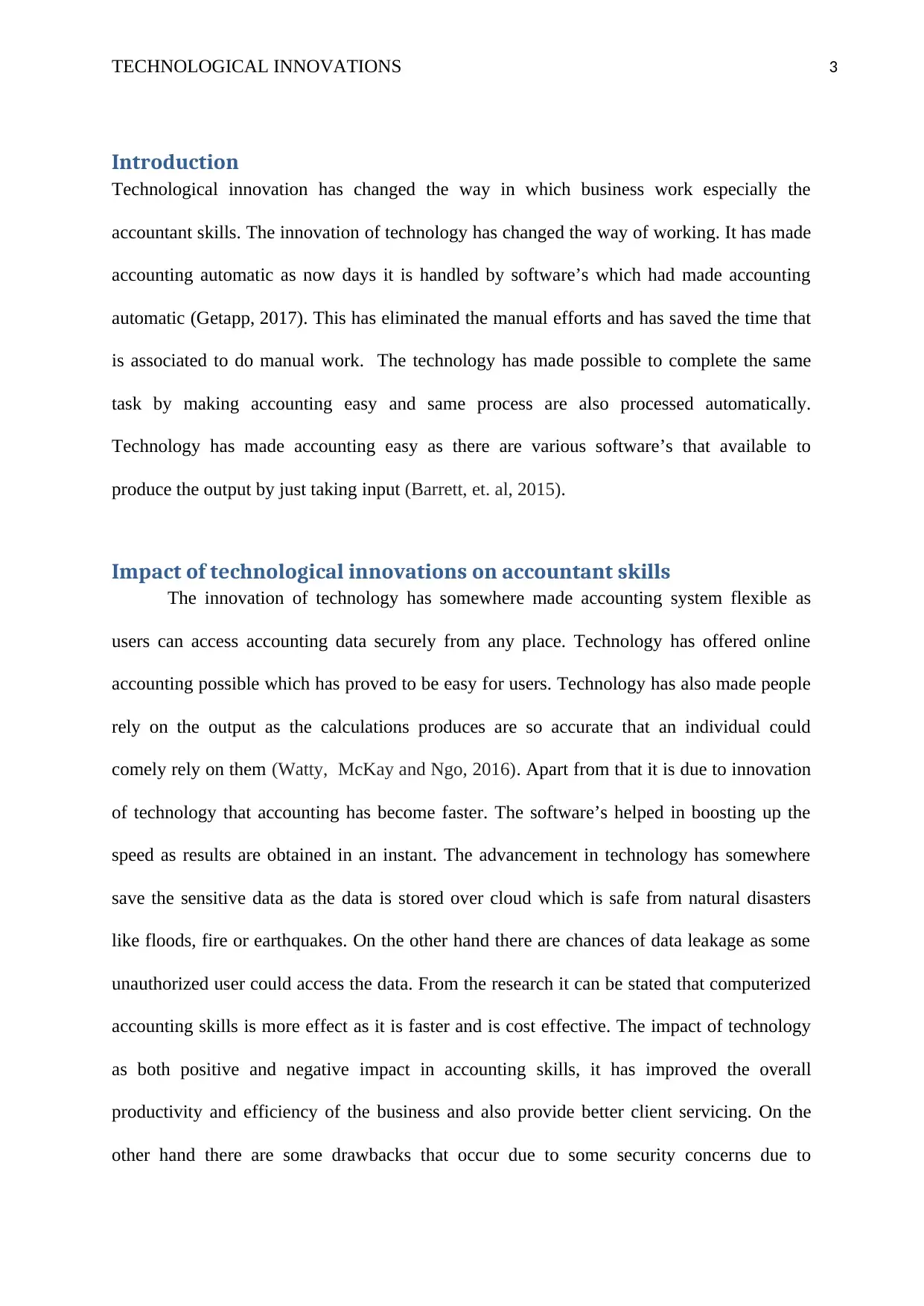
TECHNOLOGICAL INNOVATIONS 3
Introduction
Technological innovation has changed the way in which business work especially the
accountant skills. The innovation of technology has changed the way of working. It has made
accounting automatic as now days it is handled by software’s which had made accounting
automatic (Getapp, 2017). This has eliminated the manual efforts and has saved the time that
is associated to do manual work. The technology has made possible to complete the same
task by making accounting easy and same process are also processed automatically.
Technology has made accounting easy as there are various software’s that available to
produce the output by just taking input (Barrett, et. al, 2015).
Impact of technological innovations on accountant skills
The innovation of technology has somewhere made accounting system flexible as
users can access accounting data securely from any place. Technology has offered online
accounting possible which has proved to be easy for users. Technology has also made people
rely on the output as the calculations produces are so accurate that an individual could
comely rely on them (Watty, McKay and Ngo, 2016). Apart from that it is due to innovation
of technology that accounting has become faster. The software’s helped in boosting up the
speed as results are obtained in an instant. The advancement in technology has somewhere
save the sensitive data as the data is stored over cloud which is safe from natural disasters
like floods, fire or earthquakes. On the other hand there are chances of data leakage as some
unauthorized user could access the data. From the research it can be stated that computerized
accounting skills is more effect as it is faster and is cost effective. The impact of technology
as both positive and negative impact in accounting skills, it has improved the overall
productivity and efficiency of the business and also provide better client servicing. On the
other hand there are some drawbacks that occur due to some security concerns due to
Introduction
Technological innovation has changed the way in which business work especially the
accountant skills. The innovation of technology has changed the way of working. It has made
accounting automatic as now days it is handled by software’s which had made accounting
automatic (Getapp, 2017). This has eliminated the manual efforts and has saved the time that
is associated to do manual work. The technology has made possible to complete the same
task by making accounting easy and same process are also processed automatically.
Technology has made accounting easy as there are various software’s that available to
produce the output by just taking input (Barrett, et. al, 2015).
Impact of technological innovations on accountant skills
The innovation of technology has somewhere made accounting system flexible as
users can access accounting data securely from any place. Technology has offered online
accounting possible which has proved to be easy for users. Technology has also made people
rely on the output as the calculations produces are so accurate that an individual could
comely rely on them (Watty, McKay and Ngo, 2016). Apart from that it is due to innovation
of technology that accounting has become faster. The software’s helped in boosting up the
speed as results are obtained in an instant. The advancement in technology has somewhere
save the sensitive data as the data is stored over cloud which is safe from natural disasters
like floods, fire or earthquakes. On the other hand there are chances of data leakage as some
unauthorized user could access the data. From the research it can be stated that computerized
accounting skills is more effect as it is faster and is cost effective. The impact of technology
as both positive and negative impact in accounting skills, it has improved the overall
productivity and efficiency of the business and also provide better client servicing. On the
other hand there are some drawbacks that occur due to some security concerns due to
⊘ This is a preview!⊘
Do you want full access?
Subscribe today to unlock all pages.

Trusted by 1+ million students worldwide
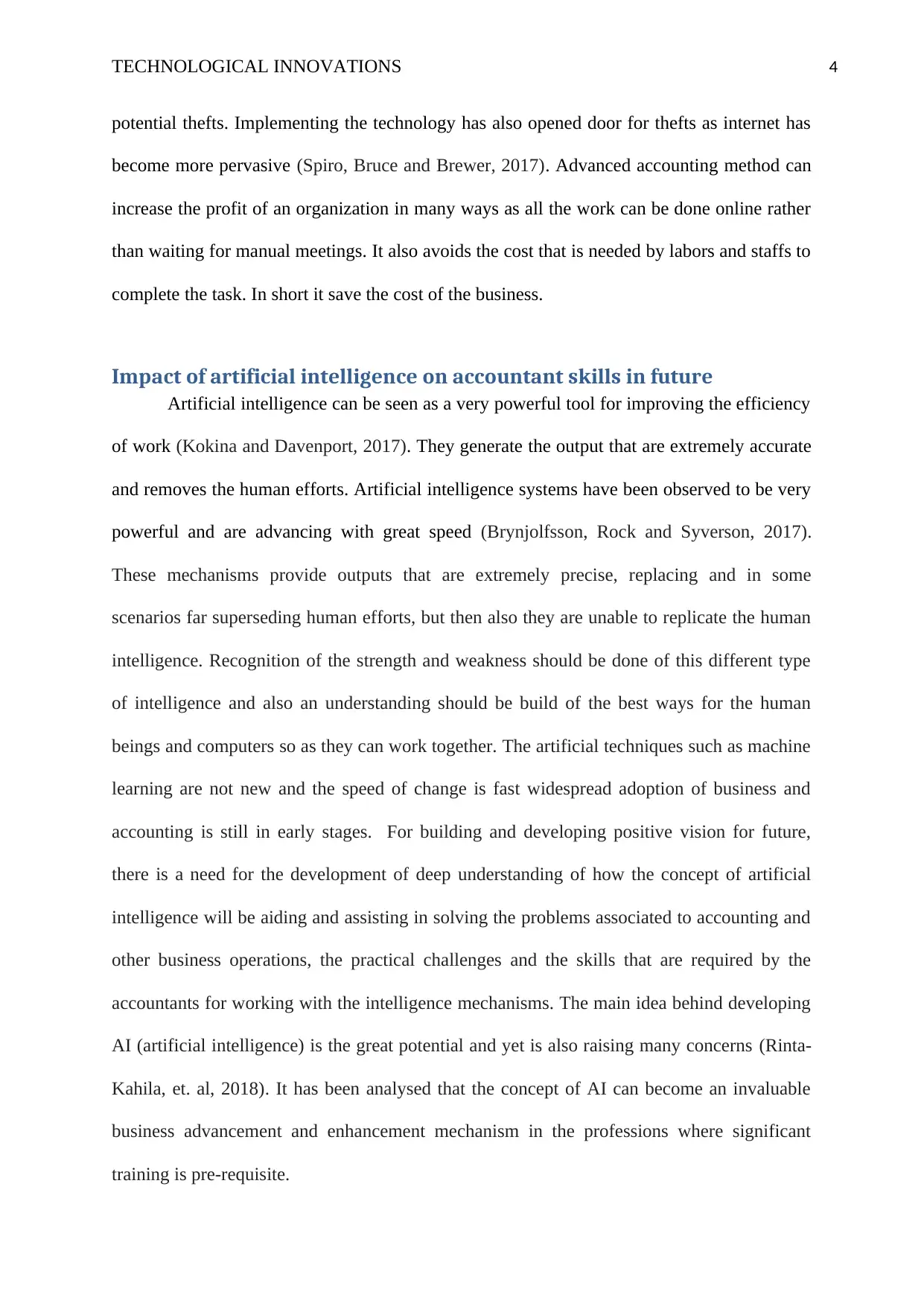
TECHNOLOGICAL INNOVATIONS 4
potential thefts. Implementing the technology has also opened door for thefts as internet has
become more pervasive (Spiro, Bruce and Brewer, 2017). Advanced accounting method can
increase the profit of an organization in many ways as all the work can be done online rather
than waiting for manual meetings. It also avoids the cost that is needed by labors and staffs to
complete the task. In short it save the cost of the business.
Impact of artificial intelligence on accountant skills in future
Artificial intelligence can be seen as a very powerful tool for improving the efficiency
of work (Kokina and Davenport, 2017). They generate the output that are extremely accurate
and removes the human efforts. Artificial intelligence systems have been observed to be very
powerful and are advancing with great speed (Brynjolfsson, Rock and Syverson, 2017).
These mechanisms provide outputs that are extremely precise, replacing and in some
scenarios far superseding human efforts, but then also they are unable to replicate the human
intelligence. Recognition of the strength and weakness should be done of this different type
of intelligence and also an understanding should be build of the best ways for the human
beings and computers so as they can work together. The artificial techniques such as machine
learning are not new and the speed of change is fast widespread adoption of business and
accounting is still in early stages. For building and developing positive vision for future,
there is a need for the development of deep understanding of how the concept of artificial
intelligence will be aiding and assisting in solving the problems associated to accounting and
other business operations, the practical challenges and the skills that are required by the
accountants for working with the intelligence mechanisms. The main idea behind developing
AI (artificial intelligence) is the great potential and yet is also raising many concerns (Rinta-
Kahila, et. al, 2018). It has been analysed that the concept of AI can become an invaluable
business advancement and enhancement mechanism in the professions where significant
training is pre-requisite.
potential thefts. Implementing the technology has also opened door for thefts as internet has
become more pervasive (Spiro, Bruce and Brewer, 2017). Advanced accounting method can
increase the profit of an organization in many ways as all the work can be done online rather
than waiting for manual meetings. It also avoids the cost that is needed by labors and staffs to
complete the task. In short it save the cost of the business.
Impact of artificial intelligence on accountant skills in future
Artificial intelligence can be seen as a very powerful tool for improving the efficiency
of work (Kokina and Davenport, 2017). They generate the output that are extremely accurate
and removes the human efforts. Artificial intelligence systems have been observed to be very
powerful and are advancing with great speed (Brynjolfsson, Rock and Syverson, 2017).
These mechanisms provide outputs that are extremely precise, replacing and in some
scenarios far superseding human efforts, but then also they are unable to replicate the human
intelligence. Recognition of the strength and weakness should be done of this different type
of intelligence and also an understanding should be build of the best ways for the human
beings and computers so as they can work together. The artificial techniques such as machine
learning are not new and the speed of change is fast widespread adoption of business and
accounting is still in early stages. For building and developing positive vision for future,
there is a need for the development of deep understanding of how the concept of artificial
intelligence will be aiding and assisting in solving the problems associated to accounting and
other business operations, the practical challenges and the skills that are required by the
accountants for working with the intelligence mechanisms. The main idea behind developing
AI (artificial intelligence) is the great potential and yet is also raising many concerns (Rinta-
Kahila, et. al, 2018). It has been analysed that the concept of AI can become an invaluable
business advancement and enhancement mechanism in the professions where significant
training is pre-requisite.
Paraphrase This Document
Need a fresh take? Get an instant paraphrase of this document with our AI Paraphraser
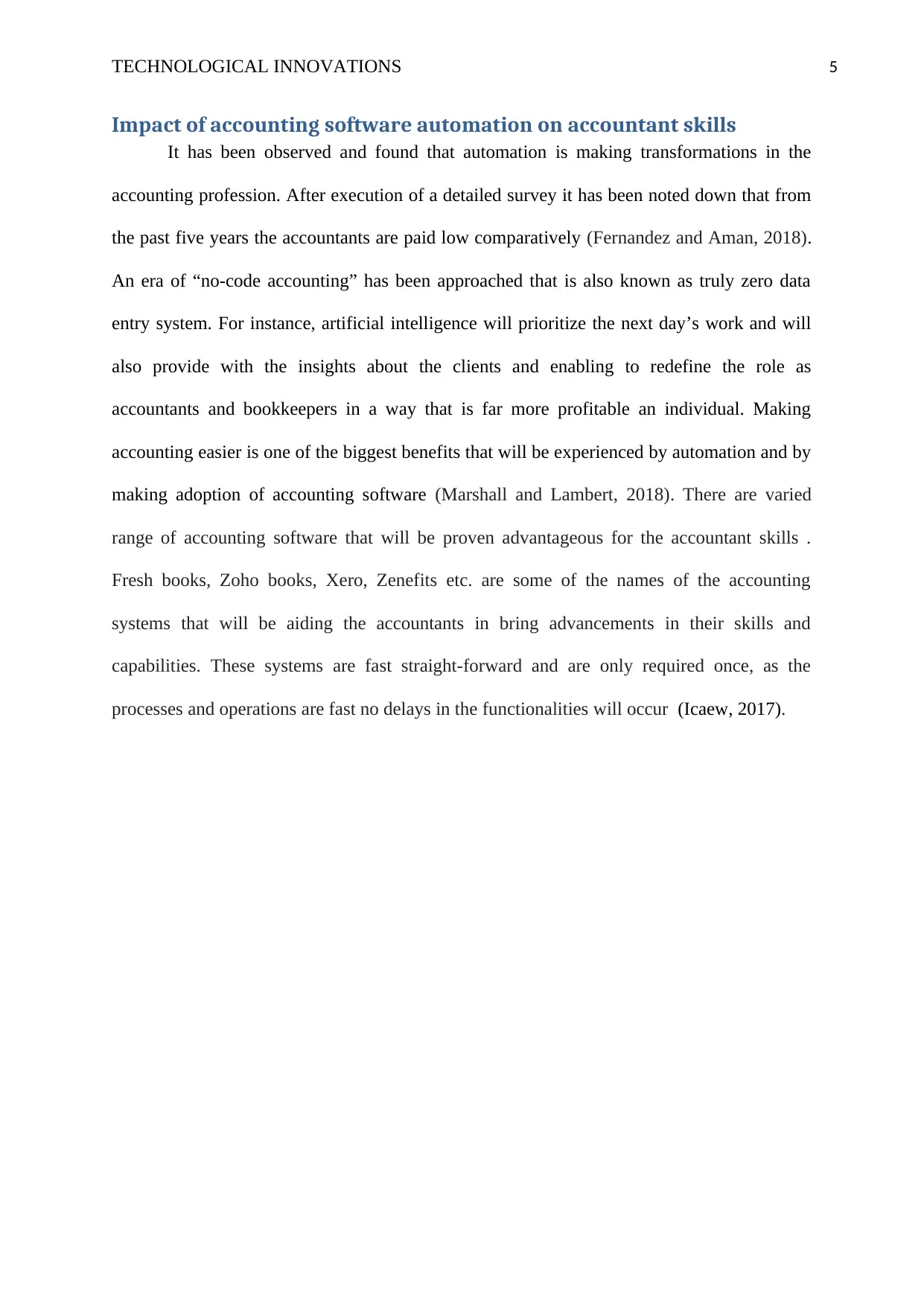
TECHNOLOGICAL INNOVATIONS 5
Impact of accounting software automation on accountant skills
It has been observed and found that automation is making transformations in the
accounting profession. After execution of a detailed survey it has been noted down that from
the past five years the accountants are paid low comparatively (Fernandez and Aman, 2018).
An era of “no-code accounting” has been approached that is also known as truly zero data
entry system. For instance, artificial intelligence will prioritize the next day’s work and will
also provide with the insights about the clients and enabling to redefine the role as
accountants and bookkeepers in a way that is far more profitable an individual. Making
accounting easier is one of the biggest benefits that will be experienced by automation and by
making adoption of accounting software (Marshall and Lambert, 2018). There are varied
range of accounting software that will be proven advantageous for the accountant skills .
Fresh books, Zoho books, Xero, Zenefits etc. are some of the names of the accounting
systems that will be aiding the accountants in bring advancements in their skills and
capabilities. These systems are fast straight-forward and are only required once, as the
processes and operations are fast no delays in the functionalities will occur (Icaew, 2017).
Impact of accounting software automation on accountant skills
It has been observed and found that automation is making transformations in the
accounting profession. After execution of a detailed survey it has been noted down that from
the past five years the accountants are paid low comparatively (Fernandez and Aman, 2018).
An era of “no-code accounting” has been approached that is also known as truly zero data
entry system. For instance, artificial intelligence will prioritize the next day’s work and will
also provide with the insights about the clients and enabling to redefine the role as
accountants and bookkeepers in a way that is far more profitable an individual. Making
accounting easier is one of the biggest benefits that will be experienced by automation and by
making adoption of accounting software (Marshall and Lambert, 2018). There are varied
range of accounting software that will be proven advantageous for the accountant skills .
Fresh books, Zoho books, Xero, Zenefits etc. are some of the names of the accounting
systems that will be aiding the accountants in bring advancements in their skills and
capabilities. These systems are fast straight-forward and are only required once, as the
processes and operations are fast no delays in the functionalities will occur (Icaew, 2017).
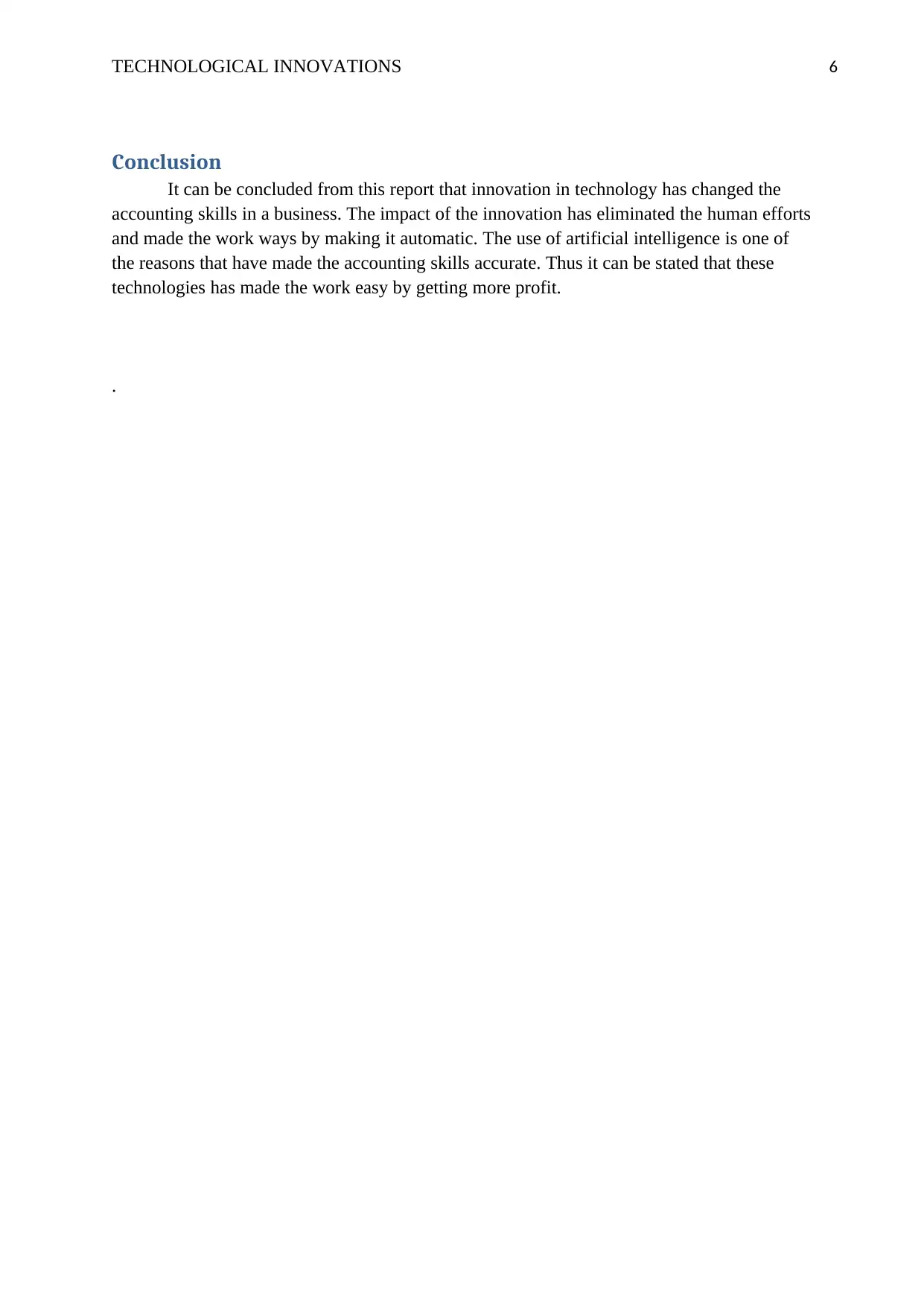
TECHNOLOGICAL INNOVATIONS 6
Conclusion
It can be concluded from this report that innovation in technology has changed the
accounting skills in a business. The impact of the innovation has eliminated the human efforts
and made the work ways by making it automatic. The use of artificial intelligence is one of
the reasons that have made the accounting skills accurate. Thus it can be stated that these
technologies has made the work easy by getting more profit.
.
Conclusion
It can be concluded from this report that innovation in technology has changed the
accounting skills in a business. The impact of the innovation has eliminated the human efforts
and made the work ways by making it automatic. The use of artificial intelligence is one of
the reasons that have made the accounting skills accurate. Thus it can be stated that these
technologies has made the work easy by getting more profit.
.
⊘ This is a preview!⊘
Do you want full access?
Subscribe today to unlock all pages.

Trusted by 1+ million students worldwide
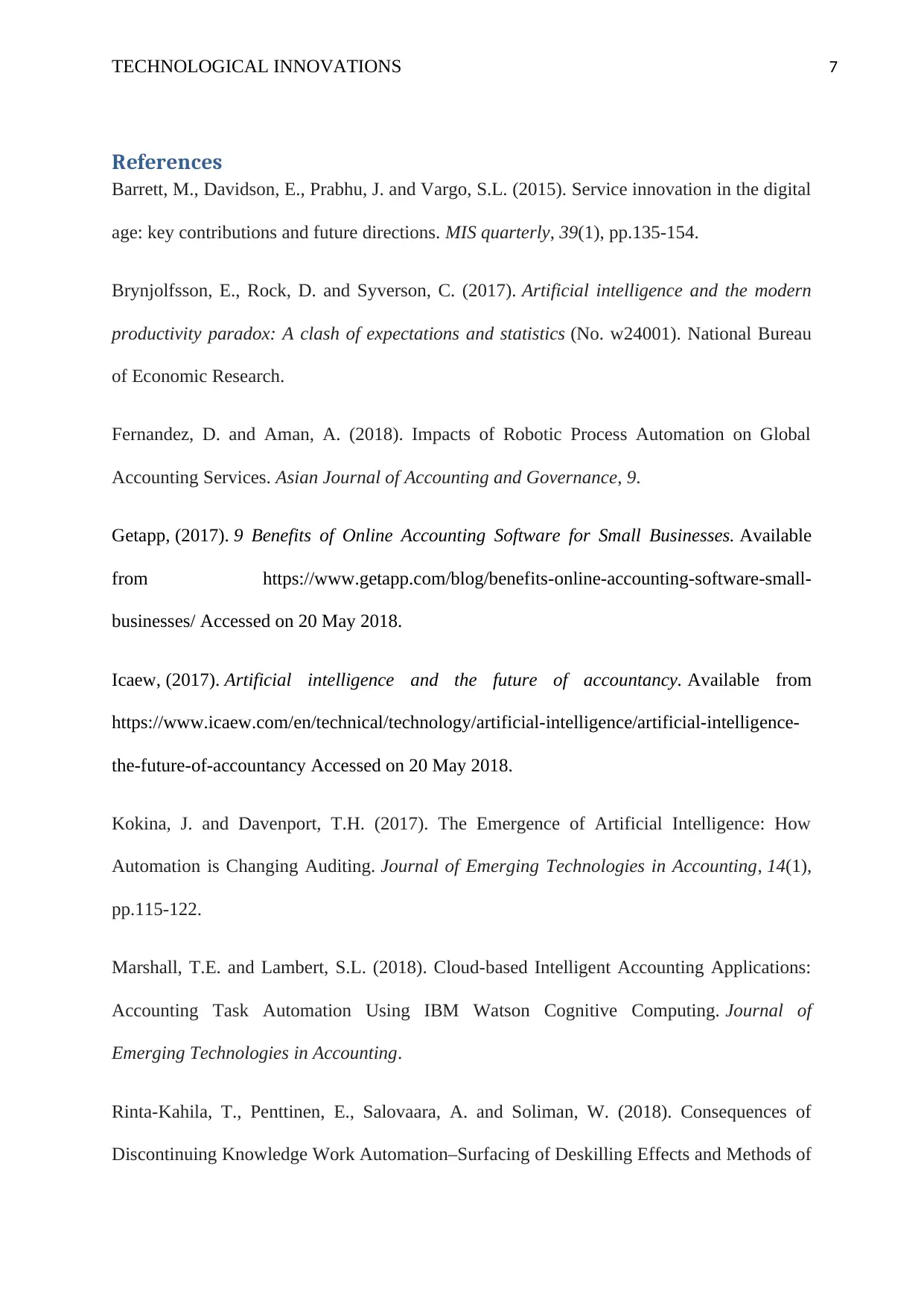
TECHNOLOGICAL INNOVATIONS 7
References
Barrett, M., Davidson, E., Prabhu, J. and Vargo, S.L. (2015). Service innovation in the digital
age: key contributions and future directions. MIS quarterly, 39(1), pp.135-154.
Brynjolfsson, E., Rock, D. and Syverson, C. (2017). Artificial intelligence and the modern
productivity paradox: A clash of expectations and statistics (No. w24001). National Bureau
of Economic Research.
Fernandez, D. and Aman, A. (2018). Impacts of Robotic Process Automation on Global
Accounting Services. Asian Journal of Accounting and Governance, 9.
Getapp, (2017). 9 Benefits of Online Accounting Software for Small Businesses. Available
from https://www.getapp.com/blog/benefits-online-accounting-software-small-
businesses/ Accessed on 20 May 2018.
Icaew, (2017). Artificial intelligence and the future of accountancy. Available from
https://www.icaew.com/en/technical/technology/artificial-intelligence/artificial-intelligence-
the-future-of-accountancy Accessed on 20 May 2018.
Kokina, J. and Davenport, T.H. (2017). The Emergence of Artificial Intelligence: How
Automation is Changing Auditing. Journal of Emerging Technologies in Accounting, 14(1),
pp.115-122.
Marshall, T.E. and Lambert, S.L. (2018). Cloud-based Intelligent Accounting Applications:
Accounting Task Automation Using IBM Watson Cognitive Computing. Journal of
Emerging Technologies in Accounting.
Rinta-Kahila, T., Penttinen, E., Salovaara, A. and Soliman, W. (2018). Consequences of
Discontinuing Knowledge Work Automation–Surfacing of Deskilling Effects and Methods of
References
Barrett, M., Davidson, E., Prabhu, J. and Vargo, S.L. (2015). Service innovation in the digital
age: key contributions and future directions. MIS quarterly, 39(1), pp.135-154.
Brynjolfsson, E., Rock, D. and Syverson, C. (2017). Artificial intelligence and the modern
productivity paradox: A clash of expectations and statistics (No. w24001). National Bureau
of Economic Research.
Fernandez, D. and Aman, A. (2018). Impacts of Robotic Process Automation on Global
Accounting Services. Asian Journal of Accounting and Governance, 9.
Getapp, (2017). 9 Benefits of Online Accounting Software for Small Businesses. Available
from https://www.getapp.com/blog/benefits-online-accounting-software-small-
businesses/ Accessed on 20 May 2018.
Icaew, (2017). Artificial intelligence and the future of accountancy. Available from
https://www.icaew.com/en/technical/technology/artificial-intelligence/artificial-intelligence-
the-future-of-accountancy Accessed on 20 May 2018.
Kokina, J. and Davenport, T.H. (2017). The Emergence of Artificial Intelligence: How
Automation is Changing Auditing. Journal of Emerging Technologies in Accounting, 14(1),
pp.115-122.
Marshall, T.E. and Lambert, S.L. (2018). Cloud-based Intelligent Accounting Applications:
Accounting Task Automation Using IBM Watson Cognitive Computing. Journal of
Emerging Technologies in Accounting.
Rinta-Kahila, T., Penttinen, E., Salovaara, A. and Soliman, W. (2018). Consequences of
Discontinuing Knowledge Work Automation–Surfacing of Deskilling Effects and Methods of
Paraphrase This Document
Need a fresh take? Get an instant paraphrase of this document with our AI Paraphraser
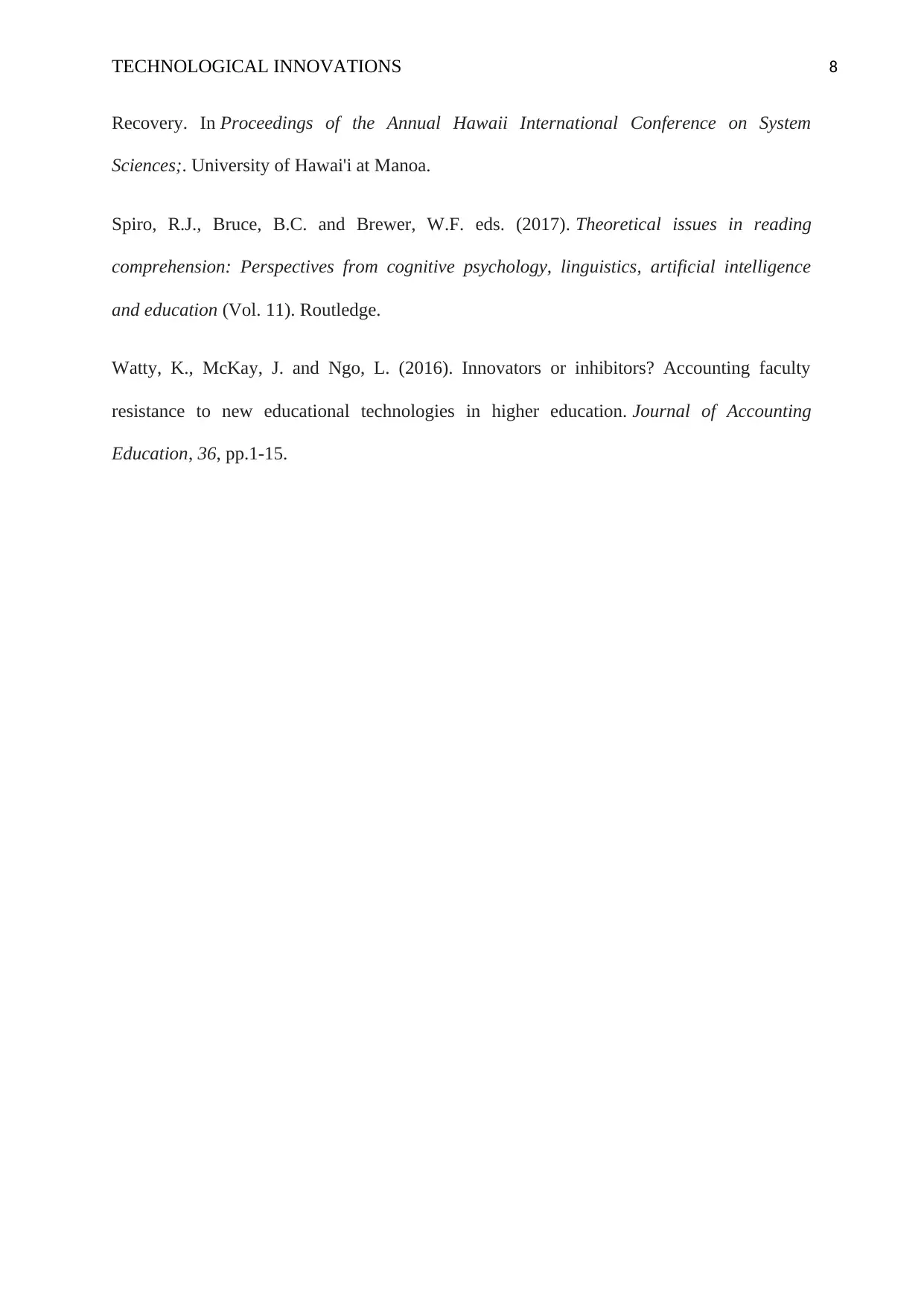
TECHNOLOGICAL INNOVATIONS 8
Recovery. In Proceedings of the Annual Hawaii International Conference on System
Sciences;. University of Hawai'i at Manoa.
Spiro, R.J., Bruce, B.C. and Brewer, W.F. eds. (2017). Theoretical issues in reading
comprehension: Perspectives from cognitive psychology, linguistics, artificial intelligence
and education (Vol. 11). Routledge.
Watty, K., McKay, J. and Ngo, L. (2016). Innovators or inhibitors? Accounting faculty
resistance to new educational technologies in higher education. Journal of Accounting
Education, 36, pp.1-15.
Recovery. In Proceedings of the Annual Hawaii International Conference on System
Sciences;. University of Hawai'i at Manoa.
Spiro, R.J., Bruce, B.C. and Brewer, W.F. eds. (2017). Theoretical issues in reading
comprehension: Perspectives from cognitive psychology, linguistics, artificial intelligence
and education (Vol. 11). Routledge.
Watty, K., McKay, J. and Ngo, L. (2016). Innovators or inhibitors? Accounting faculty
resistance to new educational technologies in higher education. Journal of Accounting
Education, 36, pp.1-15.
1 out of 8
Related Documents
Your All-in-One AI-Powered Toolkit for Academic Success.
+13062052269
info@desklib.com
Available 24*7 on WhatsApp / Email
![[object Object]](/_next/static/media/star-bottom.7253800d.svg)
Unlock your academic potential
Copyright © 2020–2025 A2Z Services. All Rights Reserved. Developed and managed by ZUCOL.





